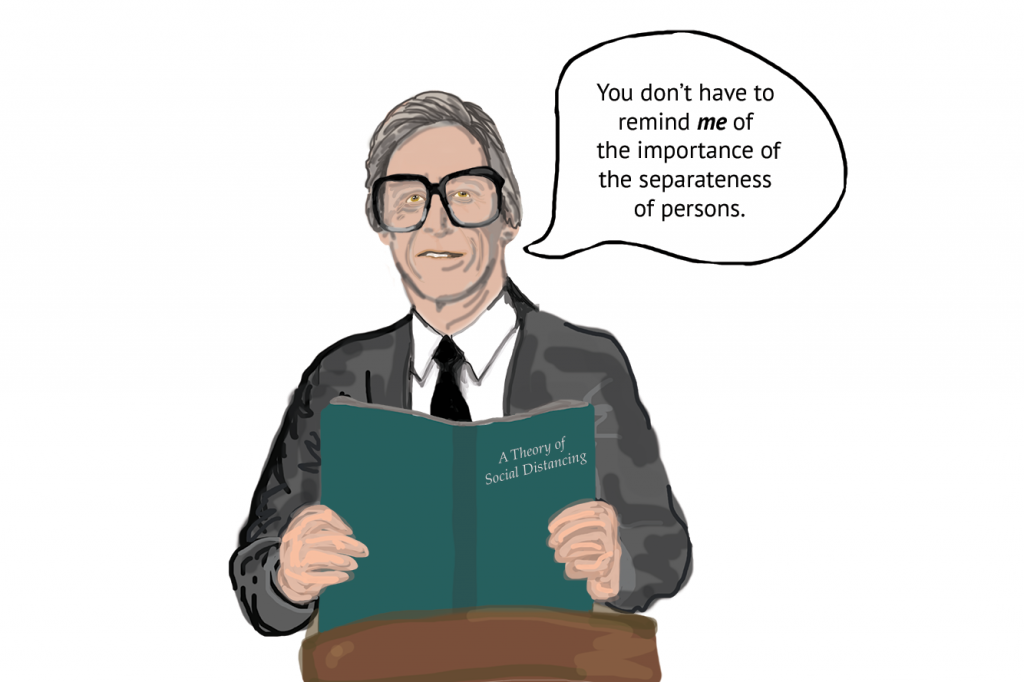Philosophers Respond to Social Distancing
How do philosophers respond to being told they have to “social distance” and avoid leaving their homes in order to slow the Covid-19 pandemic?
Philosophers Respond to Social Distancing
by Justin Weinberg
Zeno of Elea: “Don’t worry, I can never reach anyone anyway.”
Pythagoras: “To encourage social distancing among my followers, I’ve lifted the ban on the consumption of beans.”
Socrates: “I’m the wisest man in all of Athens because I know that I know nothing about epidemiology. That said, I have a question.”
Diogenes: “How am I supposed to ‘social distance’ when I live in an open barrel right here in the marketplace!… Oh. Got it.” [Starts masturbating]
Plato: “Okay everybody, change of plans: stay inside your caves!”
Diotima: “You are telling me this? I am literally the person who managed to delay the plague of Athens for ten years by getting everyone to make sacrifices, but by all means, sir, go ahead.”
Aristotle: “If you were any closer I’d die of your virus, and if you were any further I’d die of boredom, so we’re golden.”
Anselm: “I can conceive a distance greater than that which you are from me, so get moving.”
Descartes: “I doubt anyone else is around.”
Hobbes: “The only thing that can prevent a war of all against all is Leviathan. Or possibly our reluctance to get anywhere near one another. All hail the virus!”
Locke: “I’ve decided to stay right here in my room.”
Berkeley: “Can we all just not give this virus another thought?!”
Hume: “Look, just because social distancing worked before doesn’t mean it’s going to work now. And I’m in the middle of a backgammon game!”
Kant: “It may be bad if we don’t social distance but that’s irrelevant, for if we imagine as a universal law of nature everyone staying six feet apart in order to survive, then we immediately see a contradiction, as humankind would have long gone extinct, and so would be unable to follow such a law.”
Bentham: “Under these conditions, I admit, poetry may have an advantage over pushpin.”
Mill: “You can’t make me stay home just because it would be good for me, and if I don’t have the virus I’m not harming anyone by going out, so this order is bogus. What’s that? Yes, I did call it a ‘very simple principle.’ Why do you ask?”
Nietzsche: “Finally, my time has come.”
Marx: “I told people to lose the chains.”
Wittgenstein: “In the end when one is doing philosophy one gets to the point where one would like just to emit an inarticulate sound—and it’s best not to do that around other people anyway.”
Sartre: “I’ve always said hell is other people.”
Quine: “This is where my taste for desert landscapes pays off.”
Foot: “I suppose no one will be riding the trolley, then, or even minding them. This gives me an idea.”
Rawls: “You don’t have to remind me of the importance of the separateness of persons.”
Thomson: “All the more reason to disconnect from the violinist.”
Parfit: “No problem. I’m not even here.”
Feel free to add your own in the comments. This post was a substitute for the usual Tuesday philosophy comic strip, which—don’t worry—will return.
Art by Audrey Martinich




Anscombe: as much as social distancing is the universal rule, it can be broken when there’s a need to treat a patient!
Weil: can we rly understand the virus unless we, too, have it…? rly?
Lewis: “Me? Already on it. Well, not me, exactly.”
Cavell: “That means we’ll have to wait some time to remarry our partners”
Heidegger: “Guess I’ll have to add one aspect in my existential analytic: being-in-the-home”
Williams: “The serious enterprise is living. And we have to live after, and during the quarantine as well”
Being at home (zu Hause seyn) must be distinguished from Being in one’s home (in der Hause seyn). The danger lies in das Unheimliche. Thus one must be neither at home nor not at home.
Leibniz: I’m thinking of installing a window in my monad.
Peter Unger: Why? There are no people. Therefore, no need for projective separation.
Daniel Dennett: Guess this means that we need more than just Elbow Room.
Socrates: “The voice has told me to spend my days in the marketplace questioning those who think they know, and so I have done. Acquit me or not: but whatever you do, I swear that I will not alter my habits — not even if I have to die for them.”
Sartre: Stay in your maison d’etre
Sartre: Hell is other people.
Max Black: Maybe if we all stay symmetrically far apart from one another, it’ll be indistinguishable from being together?
Confucius: “One who hates what is not humane would act in such a way that he would not allow anything inhumane to come near him” (Analects 4.6)
Confucius: “Virtue is never alone. Whoever practices it will always have neighbors…who remain six feet away” (Analects 4.25)
Confucius: “If one does not overstep the boundaries, one can afford to be relaxed in minor matters” (Analects 19.11)
Social distancing. Lessons from Schopenhauer’s Porcupine Parable:
On a cold winter’s day, a group of porcupines huddled together to stay warm and keep from freezing. But soon they felt one another’s quills and moved apart. When the need for warmth brought them closer together again, their quills again forced them apart. They were driven back and forth at the mercy of their discomforts until they found the distance from one another that provided both a maximum of warmth and a minimum of pain. In human beings, the emptiness and monotony of the isolated self produces a need for society. This brings people together, but their many offensive qualities and intolerable faults drive them apart again. The optimum distance that they finally find that permits them to coexist is embodied in politeness and good manners. Because of this distance between us, we can only partially satisfy our need for warmth, but at the same time, we are spared the stab of one another’s quills.
Rousseau: “I did warn you that man is born free but everywhere he is in chains.”
Confucius: “Obey your elders! Practise social distancing! And obey your elders!”
Hobbes: “Yep, social distancing is nasty and brutish, but it won’t be short.”
Parfit: “What matters right now is that we survive this pandemic!”
G. A. Cohen: “This doesn’t just apply to the basic structure. Everyone has to do it!”
Scanlon: “I don’t see why anyone would reasonably reject staying inside. I mean, Netflix is awesome.”
Wollstonecraft: “”The men are all to blame for this mess. Let the women take over! I salute Deborah Birx, for she is an educated woman with much good sense.”
Aristotle: “Now we have all the leisure to pursue the best life we want! Stuck in our homes, anyway.”
Beauvoir: “We can distance ourselves only through the distance of others.”
Tom Nagel: What is it like to be Covid-19?
What is it like to eat a bat?
Hegel: “Social distancing is the highest actualization of reciprocal freedom”.
Camus: “Only through social distancing can man accept the absurdity of existence”
Heraclitus: At least you can’t catch the same virus twice.
Cratylus: You can’t even catch the same virus once. Problem solved.
Kierkegaard: I’m concerned with my own experience and my moral evolution towards Christianity, so virus schmirus.